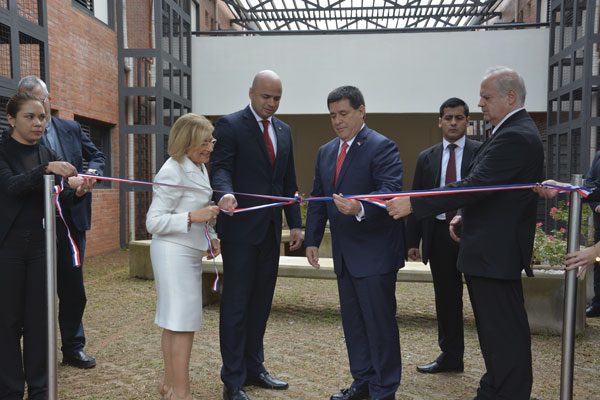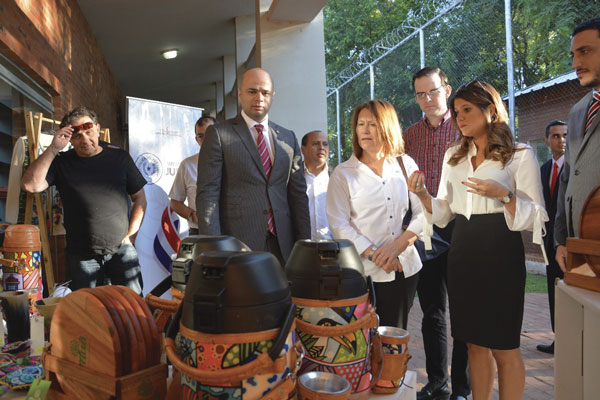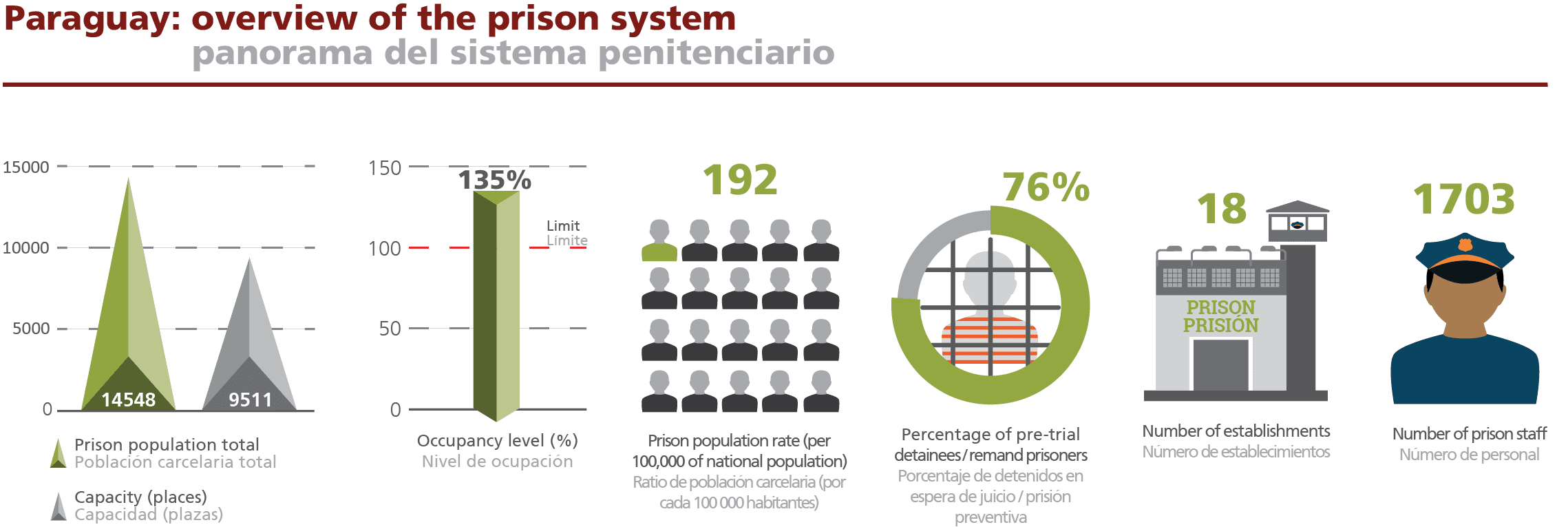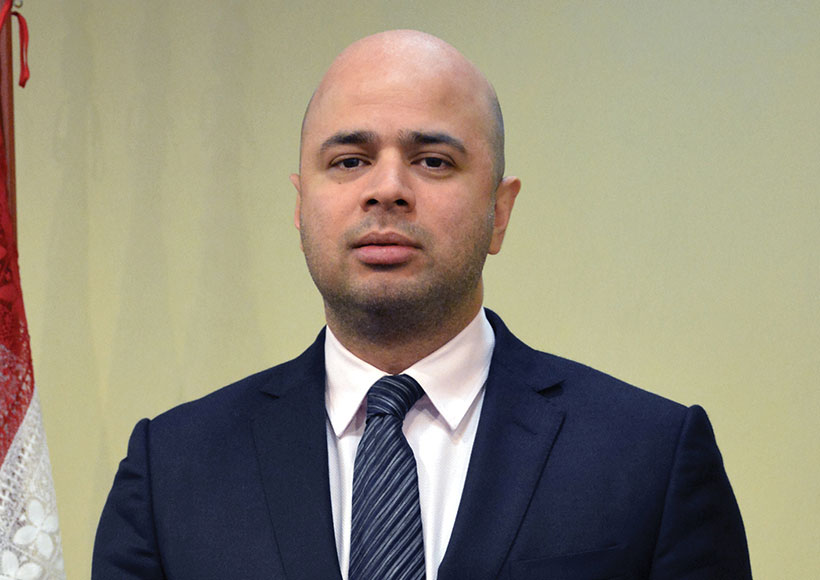// Interview: Ever Martínez
Paraguay’s Minister of Justice
JT: What are the main challenges facing the Paraguayan justice system in general and the prison system in particular?
EMF: Our current Constitution is twenty-six years old. To date, there is a general consensus on the need to make substantial changes, for which a National Constituent Convention is necessary. On August 15 (2018), a new government, which has also publicly expressed this need, assumes office.
This consensus encompasses broader levels, even as we speak of the need for necessary changes in the judicial system. The most important changes that have been agreed upon have to do with judicial independence – the depoliticisation of justice – and cover issues such as the selection of magistrates by the Magistrates Council (which is the body in charge); the trial of magistrates by the Jury of Judgement; and also budgetary autonomy, which is not a subject frequently handled at the political level, although it is necessary for the judiciary to enjoy full independence, so that it does not have to be subject to political ups and downs or political favours every year.
As for the penitentiary system, in particular, we have a significant deficit in penitentiary infrastructure: there are more than 14,000 people incarcerated and we have only 9,000 places available. However, we are aware that new prison infrastructure alone does not lead to any change, and we are therefore also committed to changing the prison management model.
JT: When H.E. took the oath of office, he stressed the objective of “continuing on the road to humanisation, but also with great firmness with regard to the institutions and the penitentiary system”.
Can you please explain in more detail the Paraguayan prison reform and what strategies and measures are being implemented?
EMF: The starting point that we take into account, in this sense, is that we cannot speak of the dignity of the incarcerated person, nor of the institutionality of the penitentiary system in the current conditions, almost collapsed in terms of overcrowding.
There is a need to build new prisons equipped with all the facilities and technologies necessary to fulfil the constitutional purpose of sentences. There is also a very clear need to comply with the laws in force since the 1960s, which provide for the separation of convicted persons from those under trial.
We are in the middle of the bidding process for a complex with four penitentiary establishments with a total capacity of 5,100 incarcerated people – which would cover the metropolitan area of Asunción–and also two prisons in Alto Paraná, with a capacity of 2,500 people. I
n the immediate stage of execution, the first venture will cover the current 40% deficit. These buildings meet all international standards in terms of treatment and design. We know that this in itself does not lead to any change if we do not focus on management.
In this regard, we have taken very important steps in the professionalisation of the prison service. The management, as it is conceived today, encompasses nothing more than practically empirical security concepts, where prison officers have not had any training to perform the delicate task they are carrying out.
Today, however, with the training we are instilling in them – the first pilot course of what will be the Higher Technical Certification in Penitentiary Management is underway – the old concepts are replaced by comprehensive training, so that they become educational agents, aware of the constitutional end of the sentence, and facilitate all the needs of those who have been imprisoned, so that they can become useful members of society.
The training course emphasizes food, health, discipline in the prison context, time management, work training, and productive use. Applicants for the post of prison officer are interns and receive a monthly salary during the six months of training: they are admitted to the prison from Sunday to Friday for an initial period of three months.
We have the technical advice of an expert in prison reform, Roberto Santana, who is visiting thanks to an agreement with the United Nations Office for Project Services (UNOPS). He has been working with us for almost a year and we intend to maintain the relationship for at least another year.
We are aware that new prison infrastructure alone does not lead to any change, therefore we are also committed to changing the management model.
JT: In 2016, the Paraguayan penitentiary system launched the Muã brand, its first penitentiary brand. What is this prison labour project about?
EMF: This is a very innovative social innovation project that aims to show penitentiary work, to dignify its identity in society and to raise awareness of work as a tool aimed at the social and labour insertion of incarcerated people.
Muã means firefly in Guarani language – its slogan is “Encendé Esperanza” (Light up the hope) –, it is the first penitentiary brand in Paraguay and the second in Latin America. Today, it boasts not only local but also international prestige, and it represents a significant disbursement of funds from the budget of the Ministry of Justice.
In order to make it sustainable, we launched a call for tenders for the management of this brand, with the support of the Inter-American Development Bank. The model has been created by the social enterprise Koga and it is at the stage where the parties interested in managing the brand are approaching us, including very important national companies in the textile area, as well as foundations.
The purpose of this call is to achieve a high standard of quality and a sustainable model, in which costs are in line with profits and where these profits actually reach incarcerated people.
Currently, some 150 women and 80 men are involved in the production of Muã. The aim is that, once this management model is implemented, the percentage of the prison population involved in this project can substantially increase.

JT: What should be done to address the high rate of pre-trial prisoners (76%) and what is the country’s situation regarding the use of alternative measures and the use of electronic monitoring?
EMF: In the context of the legal framework for pretrial detention in the country, the Criminal Code in force since 2000 has established the exceptional nature of pretrial detention in accordance with the Constitution of Paraguay.
Along the same lines, the Code of Criminal Procedure establishes the conditions for the granting of alternative imprisonment measures and, basically, imprisonment is established for cases in which there may be a danger of escape or obstruction of justice, as well as in cases of violation of individuals’ right to life.
These powers were diminished over time and that principle changed substantially; it was modified by a law that came into force in 2011. This law prohibits granting alternative measures for cases with a probable sentence of more than 5 years. Thus, the prison population has increased substantially in recent years and today, we are paying the price.
As for the monitoring system using electronic ankle bracelets, although it should come into effect in a few months, we are rather sceptical: not only because there are no significant preparations–on behalf of the body responsible for its implementation, the Supreme Court of Justice–but as to certain conditions that were stipulated by law.
That makes us sceptical of claims that it will help reduce overcrowding. It is basically along the lines of this law from 2011, which establishes very specific conditions for the granting of alternative measures, so we do not see it as a solution. At the time, as the Ministry of Justice, we have expressed our objections to both the committees of the two chambers and to the plenary, but they have not been heeded.
The prison population has increased substantially in recent years and today we are paying the price.
JT: What are the external entities involved in the reform process and how important are they?
EMF: We are working very closely with the Ministry of Education on the creation of the Higher Technical Certification in Penitentiary Management. At the same time, the Ministry of Education is the body responsible for the training and education at prisons.
We have been expanding education beyond basic training. In addition, several private universities incorporated not only technical certifications but also undergraduate degrees such as law and accounting, for incarcerated persons.

With the Ministry of Health, we have been working very closely together to establish adequate facilities for health care in prisons. In addition, we have been providing health care personnel to prisons where the current staff cannot provide adequate health care.
The professional training courses taught in the various penitentiaries are developed in collaboration with the Ministry of Labour, and then we also have a great alliance with the Ministry of Industry and Commerce in terms of the locating and exporting the products produced in the penitentiaries.
The Inter-American Development Bank (IDB) has been a very important ally in much of the work we have been doing in the penitentiary system, as well as the Andean Development Corporation, the Latin American Development Bank, the International Committee of the Red Cross, PacCTO, UNOPS and UNODC.

JT: Could you tell us what is happening in the area of juvenile justice?
EMF: Paraguay had an outstanding debt since 2001, when there were fires at the facilities of what were virtually the juvenile correctional facilities. Paying off this debt has taken time, but last year we just opened the country’s largest education centre for minors.
It houses almost 50% of the incarcerated minors of the country, in Itauguá. It has been the work of the government of President Horacio Cartes, following his very instructions to dignify the penitentiary system and the system of juvenile offenders. We have put aside the old operating scheme, and we now have a broad approach, strengthening the tasks of social workers, healthcare staff, psychologists, educational agents, etc.
An approach that involves not only physical health care but also mental health, quality of life, participation of the family, communities and even victims. It is a socio-educational model and this has been accompanied by the abandonment of those very precarious facilities in which they were housed, where they lived in housing units of 40 or 50 people.
Today, they share rooms for two people, with all the comforts, which makes treatment much easier. Of course, living conditions are accompanied by a management model that has been quite successful.
We have been working not only in the context of housing these minors, but also, when the judges themselves grant the alternative measures to the prison, there is a follow-up office for these alternative measures so that they are effectively enforced and these young people do not return to the system.
JT: What do you feel most proud of about what has been done for the justice system in Paraguay?
EMF: I have started with this government from the Vice-Ministry of Justice and for almost two years I have been in the Minister.
On August 15, 2018, there was a change of government, so, more than a future perspective, in terms of management as a team, we have the satisfaction of leaving very important foundations in what is the paradigmatic change of the management model of the penitentiary system.
This has been made effective in the juvenile system because, in addition to the significant change that I mentioned, we have separated the operation of these educational centres from the penitentiary establishments because they previously functioned as independent units of the penitentiary establishments, when we know that the treatment of minors is not the same as that of adults.
In the adult penitentiary system, we are laying the foundations for the construction of these new penitentiary institutions in accordance with all the international standards and also with regard to the management model, with a very important training academy, with a fully designed network and a pilot plan in full execution that will finish during this government period.
Apart from prison management, the Ministry of Justice has been playing a coordinating role in public policies regarding access to public information. In this sense, we have been able to consolidate not only the expansion of the institutions that have joined the portal – the 92 we had very recently have increased to over 300.
By the end of 2016, we had only 12 local governments joining the Access to Information portal; and we have raised that number to 192. Something is still missing, but that is a task that we have been carrying out with great enthusiasm. These numbers represent a 1,600 % increase in little more than a year and a half, and we will continue on that path. It should be noted that we also have a partnership with the Ministry of Education in the area of access to public information.
Everything related to access to public information is taught in the country’s public schools in such a way as to raise awareness, from a very early age, that access to public information is a human right.
Without a doubt, the establishment and consolidation of this human right are one of the most important legacies of this government, which is not only limited to the management of the Ministry of Justice, but which is a legacy of the national government and President Horacio Cartes for future generations.
//
Ever Martínez Fernández is a lawyer graduated from the National University of Asunción, Paraguay. He completed postgraduate studies at universities in the United States and England, where he obtained degrees as Senior Managers in Government Program (Harvard Kennedy School), as well as the International Mergers and Acquisitions from the International Bar Association and College of Law of England and Wales and King’s College London (LL.M.). He was Vice-Minister of Justice (2013-2016) and, previously, he had worked as a rapporteur for the Supreme Court of Justice and the Court of Audit and as a judicial officer in the Court of First Instance for Civil and Commercial Matters. In his resume he also lists his professional experience as a consultant in several companies. He co-authored several legal works and was a speaker at international conferences.


